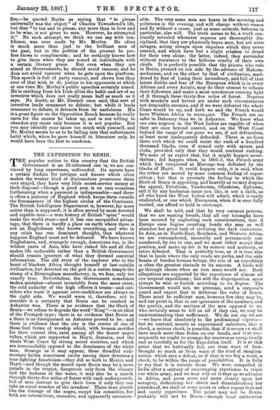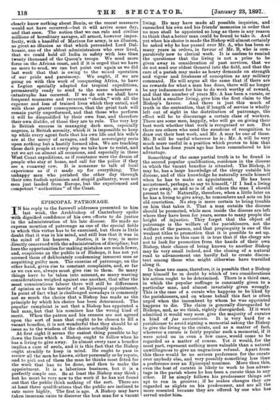THE EXPEDITION TO BENIN.
THEpopular notion in this country that the British Government is an ill-informed one is, we are con- vinced by long experience, unfounded. Its agents have a, certain disdain for intrigue and finesse which often makes the weaker kind of diplomatists pronounce them very stupid, they have very little secret-service money at their disposal—though a good sum is on rare occasions forthcoming when a payment is indispensable—and there is often a jealousy of England which keeps them outside the freemasonry of the highest circles of the Continent. The British Intelligence Department is, however, far more active than is supposed; it is often served by most devoted and capable men—a true history of British " spies " would make the world stare—and it has one unequalled advan- tage, that there is hardly a place on earth where there is not an Englishman who knows everything, and who in any crisis has one dominant thought, that whatever happens England must not be defeated. We have known Englishmen, and, strangely enough, Americans too, in the wildest parts of Asia, who have risked life and all that makes life endurable rather than a British Government should remain ignorant of what they deemed essential information. The old story of the explorer who in the heart of blackest Africa thought himself at last outside civilisation, hut detected on the god in a native temple the stamp of a Birmingham manufactory, is, we fear, only too exactly true. Nevertheless, the Government sometimes makes mistakes—almost invariably from the same cause, the cold audacity of the high officers it trusts—and out- siders who warn it against over-confidence are always on the right side. We would warn it, therefore, not to consider it a certainty that Benin can be crushed as Ashantee was. There is no evidence that the Sheik of Benin—we refuse to degrade the word "King"—is an idiot of the Prempeh type; there is no evidence that Benin as a State is as disorganised as Ashantee proved to be ; and there is evidence that the city is the centre of one of those foul forms of worship which, with human sacrifice for their central idea, exist among all the fiercer negro tribes, which are supported in Hayti, Jamaica, and the whole West Coast by strong secret societies, and which are irreconcilably opposed to the dominance of the white man. Strange as it may appear, these dreadful rudi- mentary faiths sometimes excite among their devotees a true fighting fanaticism—they did so both in Mexico and Hayti—and though the march upon Benin may be a mere parade in the tropics, dangerous only from the climate and the badness of the water, it may also be a march through thirty-five miles of forest with rank undergrowth, full of men content to give their lives if only they can take an equal number of the invaders'. There is no puzzle like the courage of the negro, except his cowardice, for both are intermittent, excessive, and apparently unreason- able. The very same men are brave in the morning and poltroons in the evening, and will charge without reason and fly without a cause, just as some animals, baboons in particular, also will. The truth seems to be, a truth con- stantly revealed whenever negroes are thoroughly dis- ciplined, that they are physically brave men, but are utter savages, acting always upon impulses which they never control, and which have but a slight relation to dread for their own skins ; the latter, indeed, they surrender without resistance to the hideous cruelty of their own chiefs. It is perfectly possible that the priests, who rule in Benin, pressed on one side by the advance of Mahom- medanism, and on the other by that of civilisation, mad- dened by fear of losing their ascendency, and full of that latent dislike and fear of the European which is in every African and every Asiatic, may do their utmost to inflame their followers, and make a most murderous running fight of it through those thirty-five miles of forest. Negroes with muskets and knives are under such circumstances not despicable enemies, and if we were defeated the whole Coast would be up, and both we and the French would have Western Africa to reconquer. The French are no safer in Dahomey than we in Ashantee. We know what our own negroes in the West Indies are capable of when they are once beyond control, and on the West Coast beyond the range of our guns we are, if not defenceless, at least most inadequately defended. There is no force there with which we could resist the rush of a hundred thousand blacks, even if armed only with spears and clubs, provided only that they would continue rushing. We none of us expect that, but it might happen never- theless; did happen when, in 1801-3, the French army which had conquered at Marengo was defeated by the blacks of Hayti. It could happen only, it is said, when the tribes are moved by some common feeling of super- stition; but that is precisely the feeling to which the Sheik of Benin is appealing, and heartily as we may despise the appeal, Fetishism, Vaudooism, Obeahism, Egboism, call it by any barbarian name you like, is not a faith, as all who know the West Indies will admit, which is easily eradicated, or one which Europeans, when it is once fully excited, can afford to hold in contempt.
We shall be told, and that by very eminent persons, that we are wasting breath, that all our triumphs have been secured by neglecting such considerations, that if Europe once begins counting heads she may as well abandon her great task of civilising the dark continents. In Asia, as in North-East, Southern, and Western Africa, we are outnumbered, incurably and permanently out- numbered, by ten to one, and we must either accept that position, and make up for it by science and audacity, or retire defeated. That is perfectly true, as it is true also that in lands where the only roads are paths, and the only beasts of burden human beings, the size of an expedition is often the greatest obstacle to its success. A knife will go through cheese when an iron mace would not. Both allegations are supported by the experience of almost all our tropical expeditions ; but still the disproportion must always be wise or foolish according to its degree. The Government would not, we presume, send a corporal's guard and expect that to dethrone the ruler of Benin. There must be sufficient men, however few they may be, and our point is, that in our ignorance of the numbers, and the quality, and the motives of the men opposed to us, who certainly mean to kill us all if they can, we may be underestimating that sufficiency. We do not say we are —we leave that absolutely to the professional experts— but we contend, merely as experienced onlookers, that a check, a serious check, is possible, that if it occurs v, e shall have much more than Benin on our hands, and tl at con- sequently we ought to arrange for reserves as energtaically and as carefully as for the Expedition itself. It is at this point that we habitually fail, not from want of fore- thought so much as from want of the kind of imagina- nation which sees a defeat, or if that is too big a word, a check, to be within the range of possibilities. It is folly to say that it is outside them. We were compelled in India after a century of encouraging experience to triple our white army, and we may rely on it that as we advance in Africa, and press more and more closely upon her savagery, dethroning her chiefs and disestablishing her priesthood, we shall at some point or other repeat that sad and costly experience. The point may not be Benin, probably will not be Benin—though local authorities clearly know nothing about Benin, or the recent massacre would not have occurred—but it will arrive some day, and that soon. The notion that we can rule and civilise millions of hereditary savages, all armed, however imper- fectly, with a handful of Marines for army, is an illusion, as great an illusion as that which persuaded Lord Dal- housie, one of the ablest administrators who ever lived, that we could hold all India in safety with less than twenty thousand of the Queen's troops. We need more -force on the African coast, and if it is urged that we have no more to send, we can but point out again as we did last week that that is owing to the mixed operation of our pride and parsimony. We ought, if we are going on with this work of conquering Africa, to have a Legion specially adapted for tropical expeditions, permanently ready to send to the scene whenever a catastrophe has occurred. If we do not we shall have frequent massacres and recurrent "checks," with all the expense and loss of trained lives which they entail, and with these graver consequences, that the great task will remain partly unperformed, and that those who perform it will be disqualified by their own fear, and therefore their own dislike, of those they are to rule. The very key Lo British success in managing dark men, especially negroes, is British serenity, which it is impossible to keep up while every agent feels that his own life and his wife's are at the mercy of savages, and that sovereignty rests upon nothing but a hastily formed idea. We are teaching these dark people at every step we take how to resist, and yet we act on almost all occasions, and especially in these West Coast expeditions, as if resistance were the dream of people who stay at home, and call for the police if they see a runaway cow. It is nonsense to talk of local experience as if it made up for everything. The unhappy men who perished the other day through their own foolish optimism and stupid gallantry, were not men just landed from Europe, but the experienced and competent " authorities" of the Coast.



































 Previous page
Previous page